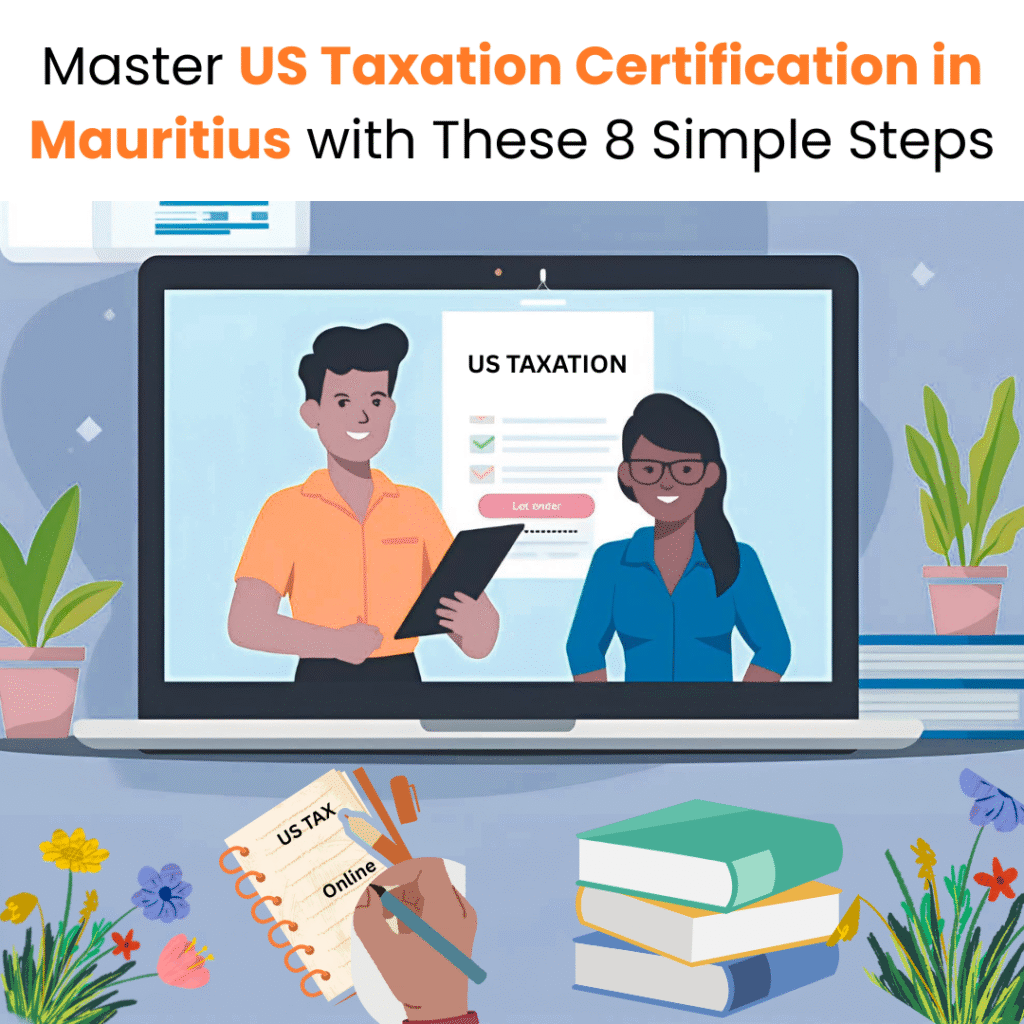INTRODUCTION:
Want a career in US taxation while studying in Mauritius? With modern study routes and the popularity of finance qualifications, distance learning has become much more accessible and flexible. US Taxation certification in Mauritius is offered by many credible institutes and trainers; students can train themselves with this credential while residing in Mauritius. As the financial landscape is getting stronger globally, aspirants are intrigued by the idea of working in the global financial sectors, specifically the US. In such a situation, this value-added US taxation certification in Mauritius can be their best pick and can help them achieve all their career goals.
With time, the number of Mauritian students interested in US tax in Mauritius is increasing, and with that, the number of aspirants enrolling in relevant US taxation certification is also growing. Now, the usual concern of aspirants of US taxation is about how to master this skill; it is normal for aspirants to feel lost while adding a new credential to their academic list. Hence, to help them master the US taxation certification in Mauritius, we came up with this descriptive blog discussing all the essential steps that can help you climb this academic ladder.
8 ACADEMIC TRICKS TO MASTER US TAXATION CERTIFICATION IN MAURITIUS:
Below are all the steps that can add value to your academic journey and also help in selecting the right certification.
1: DEFINE YOUR GOALS AND SCOPE:
The actual beginning point is not when one starts preparing academically, but rather when you are in the process of selecting the right credential. It is the most basic yet a very important step that shouldn’t be overlooked; students are encouraged to first understand what their career goals are and what their expectations are from the US taxation certification in Mauritius, which they are looking forward to enrolling in. Once they know what they are looking for, they can search for relevant US tax certificates in Mauritius and choose the one that best aligns with their requirements.
2: RESEARCH RELEVANT COURSES:
Once an aspirant’s goals are clear and they know exactly what they want, they can start doing their research about credentials available in the region and also the credible learning partners. There are many well-recognized institutes/ learning providers offering courses for US tax, ACCA, ICAEW, etc in Mauritius; aspirants can assess their teaching patterns, faculty background, and passing rates, then make the final decision.
3: ENROL IN A SUITABLE COURSE:
As mentioned before, go for the course that perfectly aligns with your goals, complements your career objectives, and is in line with your learning preferences. Once you find such a course and meet all the entry requirements (if any), then be quick to begin with your academic experience.
4: STUDY THE US TAX LAW FUNDAMENTALS:
If you have no academic background or knowledge about US taxation, it is better to start understanding the fundamentals of US taxation in Mauritius. Students usually think they can manage the advanced concepts without familiarizing themselves with basic principles; this is not how things work, especially in finance. Hence, it is recommended for students to start learning the basics of the US tax system, studying international tax laws, and familiarizing themselves with FATCA, etc. To have a good grip on basic tax laws, students may use case studies and real-world scenarios.
5: GAIN PRACTICAL EXPERTISE:
Do not rely on theory or understanding without any practice; if you really want to master US tax in Mauritius, it can not be done without gaining practical expertise. Use case studies, stimulation exercises, and volunteer for relevant internships to gain expertise; these practices will help you stand out in the practical world with your extraordinary skills.

today!
6: OBTAIN THE CERTIFICATION:
Once you focus on having a good grasp of the fundamentals of US tax laws and gaining practical expertise, you are halfway there. Now complete the coursework, clear exams, and get done with your course requirements. Once you are done with your US taxation certification in Mauritius, keep your transcript saved as proof and add the credential to your professional profile.
7: MAINTAIN YOUR QUALIFICATION:
US tax laws and regulations are ever-evolving; hence, having a certification is not enough to stay relevant in the practical world; you need to maintain your qualification by staying current with any changes or updates made in the tax regulations. Some certifications of US tax in Mauritius like ACCA globally focus on CPD, but even if yours don’t, you need to focus on CPD yourself by participating in relevant sessions/ seminars, etc.
8: MARKET YOUR NEW EXPERTISE:
Be quick to add the certification to your resume right after you have completed it; let employers and clients approach you and start gaining experience. Once you have enough experience, you can also apply for roles in MNEs or other big employers.
CONCLUSION:
US taxation certification in Mauritius has also been in the limelight for quite some time; it seems like aspirants are eager to work in the finance sector of the US. Know that these taxation certificates are specified and keenly focus on US tax laws only; if you really want to master it, start by familiarizing yourself with basic principles first. There are various other factors as well, discussed in the blog, that one needs to focus on if they are really committed to becoming an expert in US tax in Mauritius.
FREQUENTLY ASKED QUESTIONS:
Q1: Can I study US tax while residing in Mauritius?
Answer: Yes, as modern technological advancements are also influencing the educational sectors, distance learning has become very common. A number of US taxation certifications offer online study and flexible exam options that encourage students from different regions to obtain such credentials.
Q2: Is there any requirement for US tax certifications to have an accounting or tax background?
Answer: It depends on which credential you are opting for; while typically, a US taxation certification in Mauritius doesn’t have any such requirement, but if you are going for an advanced, professional qualification, then it might have certain eligibility requirements.





